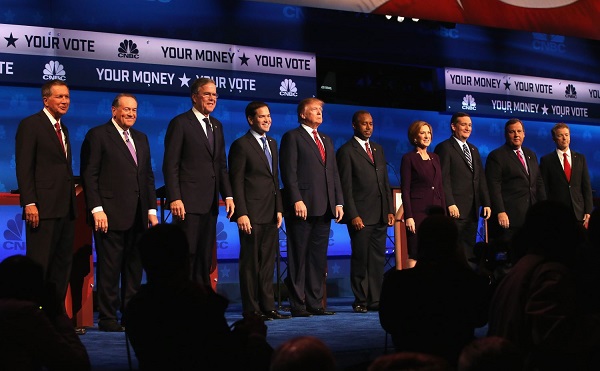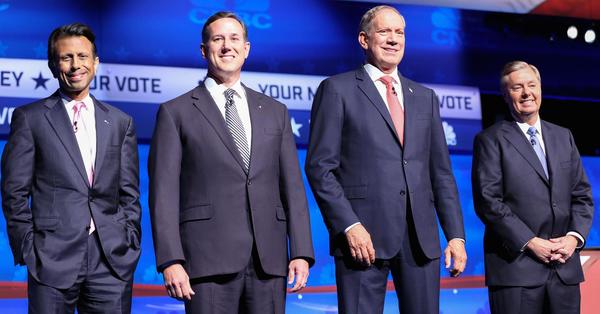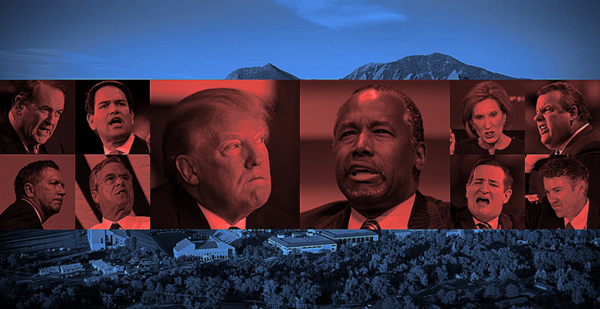
Nabisco, peanuts, Krispy Kremes, pie in the sky, brownies, and hamburger were all name-checked by the candidates on the main stage. Maybe they had the munchies?
CNBC fielded the same batch of anchors for the primetime debate as they had for the undercard, and Becky Quick was audibly hoarse by the end of the ordeal. Questions were about as tough as those from previous Republican roundups, but moderation was unusually capricious and adversarial. That didn’t seem to bother most of the candidates, who were spoiling for a fight anyway after recent upheavals in the primary race – which made this either the most or least fun debate to watch, depending on how you feel about snide comments.
After two hours on the rhetorical battlefield, who has gained ground and who has lost it? DebateWatch breaks it down for you, ranking the candidates’ performances – and, as always, we, like Drake, start from the bottom…
10. Kentucky Senator RAND PAUL
Rand Paul is officially a marginalized candidate. After expressing (understandable) confusion over the rules for rebuttals and why he hadn’t been awarded one in the central doldrums of the debate, Becky Quick retorted “It’s at the moderator’s discretion,” and moved on to another candidate. The crowd guffawed.
The junior senator from the Bluegrass State did eventually get his desired follow-up, but to little effect. One might have thought that, energized by his “dumbass livestream” and favored by the economic focus of the debate, Paul might have done well in this contest. Unfortunately, the things that make Rand Paul “a different kind of Republican” are mostly not economic issues. Without his iconoclastic foreign policy to trot out, and with the only marijuana question going to John Kasich, Paul quickly faded into the background and did not return.
9. Former Florida Governor JEB BUSH
Oh how the mighty have fallen. Jeb Bush’s collapse in the polls was noteworthy enough that moderator John Harwood even pointed out during the debate that the former Sunshine State governor was standing further from center stage tonight than in Simi Valley.
Bush learned his lesson from the CNN debate and refrained from throwing punches at Trump this time around – and his performance was better for it. But being dealt the second-smallest chunk of speaking time (only 24 seconds more than Rand Paul) and tying for the fewest direct questions took its toll. Bush hawked his gubernatorial record and his tax plan but lost face in an exchange with Marco Rubio over the latter’s Senate voting record (not a bad strategy, but Rubio was prepared). Donors pushing the panic button over Bush’s campaign struggles found no succor in his appearance tonight in Boulder.
8. Ohio Governor JOHN KASICH
It seems no Republican has changed as much from the first debate to the third as John Kasich. In Cleveland – his backyard – the Buckeye State governor was relaxed, comfortable, and easygoing. After announcing that he was sick and tired of the state of the GOP primary race, he entered the Coors Event Center literally vibrating with anger. Happy-go-lucky John had been replaced by someone who was either really mad or really had to pee.
Kasich exploded on command early in the debate, railing against what he considered the “fantasy” of Trump’s and Carson’s economic plans. Carson, predictably, held off counterattacking, but Trump returned fire by blasting Kasich as an old Lehman Brothers crony and attributing Ohio’s economic fortune to fracking rather than gubernatorial leadership. Kasich retreated to his talking points about Ohio from then on, and finished with a bafflingly irrelevant closing statement. In 2012, Newt Gingrich began his campaign with joy and resorted to acrimony out of frustration; to this point, Kasich seems to be following a similar trajectory.
7. Former Arkansas Governor MIKE HUCKABEE
Mike Huckabee wore a Trump tie to the debate tonight (candidates at neighboring podiums asked him to check whether it was made in China or Mexico). That’s pretty much all you need to know about the self-appointed troll of the GOP field, who seems to delight in doing exactly what you don’t expect him to do every chance he gets.
DebateWatch has noted previously that the former Natural State governor tends to not give a particular reason why he – as opposed to another Republican – should be president. He finally did give one to CNBC: he has won elections against “the Clinton machine” before. The problem is that this really isn’t a very compelling reason on which to build a campaign. The debate’s economic focus accentuated Huckabee’s unflattering populist side, and his only truly unique proposal was to “declare a war” on the four diseases that account for the largest chunk of American healthcare expenses. DebateWatch wishes the Reverend the best of luck on his book tour of a campaign, but also concedes that he will need it.
6. New York real estate tycoon DONALD TRUMP
Someone clever (perhaps even Donald Trump) sagely advised Donald Trump not to sic himself on Ben Carson in Boulder. For whatever reason, the business mogul heeded that advice, and was relatively subdued throughout the debate after two contests where he pulled no punches.
DebateWatch remains amazed that Trump is still getting away with his incredibly nonspecific proposals for growing the economy and dealing with foreign trade partners. Yet we cannot deny that he handled himself rather well on the debate stage. Of course, that’s not to say that his performance was any less bizarre than his earlier outings: he essentially stopped the debate to issue a vague and cryptic warning about the spectre of super PACs, and used his closing statement to brag about bullying CNBC into truncating the debate to two hours (which moderator John Harwood unconvincingly denied). Trump may be down to Carson in some polls, but at least on the debate stage he is not running out of steam.
5. Former Hewlett-Packard CEO CARLY FIORINA
It was only a matter of time before Carly Fiorina broke her debate winning streak (according to DebateWatch’s scorecards). As far as “defeats” go, however, this wasn’t a particularly devastating one. Fiorina had the most speaking time of any candidate (10 minutes, 32 seconds), much of which she earned through calculated interruptions.
Challenged again on her record with HP, Fiorina went several rounds with Becky Quick and came out ahead. Much of her rhetoric was recycled from previous debate appearances (which were themselves largely cut-and-pasted from her stump speeches), and she harped perhaps too much on how problems had been talked about for years but never solved. Fiorina didn’t do anything to drive down her poll numbers on the debate stage, but her support has tended to wane between debates, and the CNBC contest might not bring her the boost she usually gets from primetime TV.
(N.B.: DebateWatch noted a striking absence of Fiorina’s “the political class has failed you” theme tonight. If she were in fact angling for the veepstakes – which she denies – this would be a smart move to make her more compatible with a potential running mate.)
4. New Jersey Governor CHRIS CHRISTIE
DebateWatch cannot speak knowledgeably about all the candidates’ levels of debate prep, but we do know that Chris Christie is the only candidate who regularly subjects himself to unrehearsed radio interviews with questions from constituents. He is built for the uncertainty of the debate environment, and proved it again tonight in Boulder.
Facing interruptions from a moderator, Christie sighed, “John, do you want me to answer or do you want to answer? Because, I’ve got to tell you the truth, even in New Jersey what you’re doing is called rude.” After the debate turned to the legality of daily fantasy sports, the Garden State governor exploded at the triviality of the topic. In between, he attacked presumptive Democratic nominee Hillary Clinton and delivered more of his trademark straight talk directly to the American people (whom he disconcertingly stared down through the camera lens). If debates were all that mattered, Christie would have been among the front-runners long ago; to the extent that they matter, he has a shot.
3. Retired neurosurgeon BEN CARSON
The number one question going into the CNBC debates was how insurgent neurosurgeon Ben Carson would handle the spotlight. DebateWatch admits to having low expectations for someone whose slow, deliberate speaking style seemed more suited to speechifying than debating.
Carson’s coolness under pressure was the surprise of the night. Although he had to look at his notes on at least one occasion when talking numbers, the GOP field’s most unlikely outsider was on point when correcting the moderators about his tithe-based tax plan (which, though biblically inspired, was not based on a similar 10% rate) and admonishing them for assuming that his traditional view of marriage was incompatible with supporting equal constitutional protections for all Americans regardless of sexual orientation (for which the audience applauded him). As a candidate, Carson leaves many questions unanswered. As a debater, he has proven a quick study.
2. Florida Senator MARCO RUBIO
Marco Rubio scurried to the front of the pack early on in the contest. After deftly dismissing Carl Quintanilla’s question about his lackluster voting record in the Senate, Rubio found his fellow Sunshine Stater Jeb Bush piling on to accuse him of not doing his job. The Florida senator’s response was picture-perfect: “I don’t remember you ever complaining about John McCain’s vote record. The only reason why you’re doing it now is because we’re running for the same position, and someone has convinced you that attacking me is going to help you.” The crowd cheered, and Rubio was off and running.
Most candidates are lucky to get one good sound bite out of a debate. Rubio – the only candidate other than Fiorina to clear ten minutes in speaking time – had enough applause lines for a whole ad campaign. He mercilessly derided the mainstream media as “the Democrats’ ultimate super PAC” for propping up Hillary Clinton after her Benghazi hearing. Smart money is on Rubio for the GOP nomination once the fourteen-candidate frenzy dies down, but the freshman Floridian senator is happily – and effectively – taking part in the frenzy while it lasts.
1. Texas Senator TED CRUZ
Newt Gingrich, the mantle has passed. Republicans have a new media gadfly, and his name is Rafael Edward Cruz. Dismayed at the initial round of questioning, Cruz ditched his first proper question to opine “This is not a cage match. And, you look at the questions – ‘Donald Trump, are you a comic-book villain?’ ‘Ben Carson, can you do math?’ ‘John Kasich, will you insult two people over here?’ ‘Marco Rubio, why don’t you resign?’ ‘Jeb Bush, why have your numbers fallen?‘”
From then on, it was open season on the moderators, and candidate after candidate followed Cruz’s example. But the Lone Star State’s junior senator was fit as a fiddle to argue policy as well, garroting the Obama administration for presiding over an economy whose downs disproportionately hurt working women (after which Fiorina seemed disappointed that one of her talking points had been preempted). Cruz has flown below the radar in the Republican primary for a long time, but he used the Coors Events Center to thunderously announce his presence in the race – and DebateWatch declares Ted Cruz the winner of the CNBC Boulder Republican Primetime debate.





